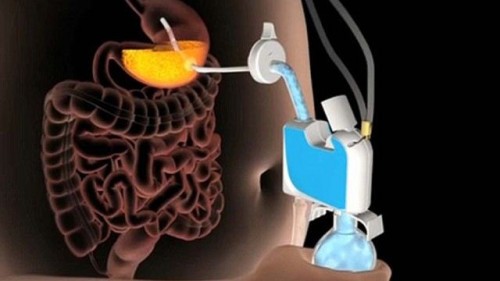When I think of a stomach pump, it is usually in the context of someone ingesting poison or excessive alcohol, and an EMT or ER pumping the stomach as an extreme health measure. Apparently now a company called Aspire Bariatrics has developed a ‘minimally invasive’ system that seeks to replace ‘gastric bypass’ surgery and offer an alternative way for people to lose weight.
According to the company:
With Aspiration Therapy, patients “aspirate” (drain) a portion of their stomach contents into the toilet after each meal through an endoscopically-implanted tube, reducing the number of calories absorbed by the body. [snip] The AspireAssist is used in conjunction with a lifestyle modification program, and requires careful and comprehensive medical monitoring.
The emphasis is mine … as it highlights a core issue.
ABC News highlighted the device, saying:
Called the AspireAssist device, it works by sucking the food right out of the stomach so that only about a third of the calories are absorbed by the body.
The concerns are obvious, and are brought up in an article over at Fox Health:
From a medical point of view, I’m concerned by the loss of not only stomach content, but also of vital electrolytes such as sodium, potassium and calcium from the stomach content. This could have a debilitating effect on other organ systems.
Dr. Manny at Fox Health notes that the “mental health component of bariatric surgery gets lost in translation”, meaning that getting a ‘lap band’ is supposed to be an extreme treatment that is only part of a total solution that MUST include behavior change at a very fundamental level.
From the ABC story:
“This is an enabling device, not a helping device,” Ayoob continued. “It doesn’t do anything to make someone change their relationship with food. Once you put this in someone, they’re never going to want it taken out.”
And as we look at so much press around eating disorders such as anorexia and bulimia, we hear about people who love cookies and cakes but not the calories, so they eat and then purge … which is pretty much what this does but without the esophageal damage. I also wonder if you become hungry more quickly, since you have emptied so much of your stomach contents?
As for the company, they offer counseling but haven’t looked at what happens after people stop using the system, saying “her company hadn’t looked at how weight loss is maintained once the device is removed but was marketing the device for long-term use”.
What do you think about a stomach pump as a weight-loss method?


I am agast. I want to lose weight….but not this way. Gastric Bypass I get…this I don’t for some reason. It just seems wrong.
I use this analogy a lot with my patients, not necessarily about obesity, but in talking about spinal disorders.
Imagine you are in a big boat that has a hole in the side of it. Water is pouring in and the ship is sinking. You’re too far from land to swim for it. Does it make more sense to figure out a way to patch the hole in the side of the ship or build the biggest bucket you can in order to try and bail out the water fast enough to stay afloat?
To me, this seems like just building a bigger bucket.